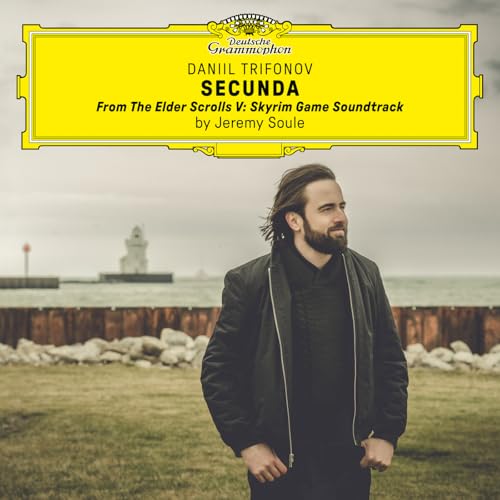
Soule: Secunda (Transcr. Trifonov for Piano) (From "The Elder Scrolls: Skyrim")

℗© 2024 Deutsche Grammophon GmbH, Berlin
Artist bios
Daniil Trifonov emerged as one of the major new stars of the piano in the late 2010s. He is also active as a composer.
Trifonov was born in Nizhny Novgorod, then part of the Soviet Union, on March 5, 1991. His father was a composer, and his mother was a music teacher. Trifonov took up the piano at five and made rapid progress. In 2000, his family moved to Moscow, and he enrolled at the Gnessin School of Music, studying piano with Tatiana Zelikman. At her recommendation, he moved to the U.S. in 2009 for piano studies with Sergey Babayan at the Cleveland Institute of Music. He also studied composition in both Moscow and Cleveland. In 2011, he released a pair of albums in Poland, one on the Dux label and one for the Fryderyk Chopin Institute. Trifonov began to rack up important competition wins, culminating in first prizes at the Artur Rubinstein International Piano Master Competition and the International Tchaikovsky Composition in 2011. The latter led to the opportunity to record Tchaikovsky's Piano Concerto No. 1 in B flat minor, Op. 23, with the Mariinsky Orchestra under Valery Gergiev, and Trifonov was soon in high demand for both concerts and recordings.
He wisely limited his appearances in the year after the Tchaikovsky Competition win to 85, although he could have played many more. Making his debut at Carnegie Hall in 2013, Trifonov settled in New York. That year, he signed with the Deutsche Grammophon label, and an album version of his Carnegie Hall recital was released there that year. He has made recital appearances at major halls in many countries, including Wigmore Hall in London, the Musikverein in Vienna, and the Salle Pleyel in Paris. His concerto credits include appearances with most of the world's top orchestras, such as the New York Philharmonic, the Vienna Philharmonic, and the Russian National Orchestra; his concerts draw an unusual amount of enthusiastic critical praise.
For the 2018-2019 season, Trifonov served as artist-in-residence with the Berlin Philharmonic. He has also been active as a composer, premiering his own Piano Concerto in Cleveland in 2014. By 2020, he had released a dozen albums on Deutsche Grammophon. Focusing on core late Romantic and post-Romantic repertory, he earned a Grammy Award in 2018 for his recording of Liszt's Transcendental Etudes. In 2020, Trifonov released the album Silver Age, featuring works by Stravinsky, Prokofiev, and Scriabin. Trifonov returned with several new albums in the 2020s, including Rachmaninoff for Two, on which he was joined by his teacher Babayan in 2023. ~ James Manheim
Best known as a versatile composer of orchestral video game music, Jeremy Soule was drawn to the industry just as technology was beginning to offer more sophisticated scoring opportunities in the medium in the mid-'90s. Born in Iowa, Soule took an interest in composing symphonic music at age five, began piano lessons, and learned writing and arranging through years of private study. After high school, he found work at the Japanese video game company Square, where he wrote his first credited score for 1995's Secrets of Evermore, incorporating orchestral arrangements and nature sounds. He went on to create more game music for other employers before founding his own music production company, Soule Media (which became Artistry Entertainment), in 2000. He scored 2000's Icewind Dale and the first Harry Potter game, 2001's Harry Potter and the Sorcerer's Stone, which led to further titles in the Harry Potter game series. Some of his other most recognized work includes Star Wars: Knights of the Old Republic, the Total Annihilation series, the Elder Scrolls series, SOCOM: The Navy Seals, and the Dungeon Siege series. In 2004, he won a BAFTA Games Award for Best Original Music for Harry Potter and the Chamber of Secrets, which he co-wrote with his frequent collaborator and brother, Julian Soule. The following year, he and his brother founded the record label DirectSong, which focused on classical and orchestral music, including their own soundtracks. Jeremy Soule's compositions can also be heard in films including the documentaries C.S. Lewis: Beyond Narnia (2005) and Dracula's Stoker (2009). Among continued game and film projects, he scored the 2013 TV mini-series The Burdens of Shaohao Prelude: The Vision and the 2014 surfing adventure film The Perfect Wave. ~ Marcy Donelson
Customer reviews
How are ratings calculated?

